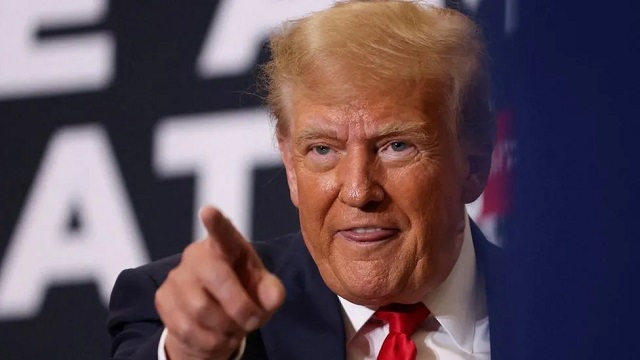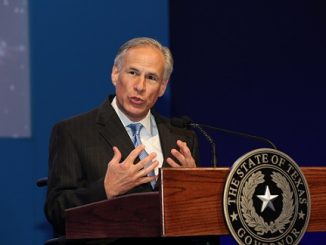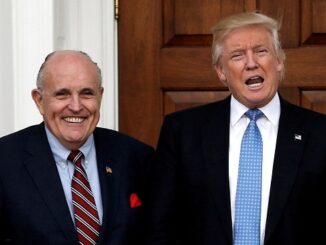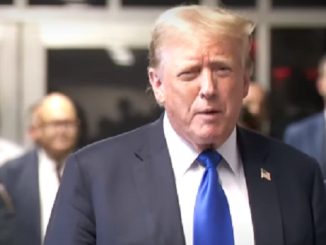
The US Supreme Court has declined, for now, to decide whether former President Donald Trump has immunity from prosecution for allegedly trying to overturn the 2020 election.
Mr Trump’s efforts to delay his trial appear to be working, as the case must now wind through the appeals process.
Special counsel Jack Smith had asked the court to take up the case in an expedited manner.
Mr Trump was indicted on election subversion charges earlier this year.
The court did not explain its decision, instead issuing an unsigned order saying that Mr Smith’s petition “is denied”.
The ruling is a setback for Mr Smith, who had asked the Supreme Court to intervene early for fear that the appeals process could delay the start of Mr Trump’s trial, which was scheduled to begin on 4 March in Washington DC.
Mr Smith’s office declined to comment on the ruling.
Mr Trump is being investigated for his alleged attempts to overturn the election leading up to the 6 January Capitol riot.
This delay marks a procedural victory for the former president, as his legal team appears intent on postponing the trial for as long as possible.
District Judge Tanya Chutkan has paused the case while Mr Trump appeals. The former president is claiming he is immune from prosecution because he was acting in his official capacity as president before and during the riot.
In court filings, Mr Smith argued the Supreme Court should consider the case because it presented “a fundamental question at the heart of our democracy: whether a former president is absolutely immune” from being prosecuted for federal crimes allegedly committed while in the White House.
“The United States recognizes that this is an extraordinary request,” he added. “This is an extraordinary case.”
In a post on his social media site, Truth Social, Mr Trump said the Supreme Court had rejected a “desperate attempt to short circuit our Great Constitution”, adding that he was “entitled to Presidential Immunity”.
Mr Trump’s lawyers had argued the request to expedite the trial was politically motivated, claiming in court filings that it was part of an effort to “ensure that President Trump – the leading Republican candidate for President, and the greatest electoral threat to President Biden – will face a months-long criminal trial at the height of his presidential campaign”.
The ruling means the US Court of Appeals for the DC Circuit will have to hear the case before it can be appealed to the Supreme Court. It is expected that the US’s highest court will eventually have to issue a ruling.
The appeals process may delay the start date of the trial, however, which prosecutors had hoped to hold before the election.
The concern for prosecutors is that the closer it gets to election day, the more mired in politics the case becomes. And if Mr Trump’s attorneys succeed in pushing the date past the election the trial could be delayed indefinitely.
The possibility also looms that, with pressure from a newly inaugurated President Trump, a delayed case could be dropped entirely.
“Trump’s delay strategy appears to be working,” Carl Tobias, a law professor at the University of Richmond in Virginia, told the BBC.
“All of [this] will consume time, and, thus, complicate efforts to start the trial before Judge Chutkan on the early March date.”
The appeal comes after Judge Chutkan had previously rejected Mr Trump’s immunity claims, writing in a ruling that the former president’s “four-year service as Commander in Chief did not bestow on him the divine right of kings to evade the criminal accountability that governs his fellow citizens”.
In the meantime, however, arguments are set to be heard in the case in DC Circuit Court on 9 January.
Mr Trump currently faces dozens of criminal charges across four cases, including two related to his alleged election subversion efforts.
Friday’s decision by the high court suggests that its nine justices are reluctant to insert themselves into Mr Trump’s ongoing legal drama if at all possible.
That may hint at how the court handles some of the numerous high-profile legal challenges involving Mr Trump that will end up on the court’s doorstep in the coming months.
The former president faces other charges in Florida, also brought by Mr Smith, for his handling of classified documents.
The decision on Friday also comes after the Colorado Supreme Court ruled earlier this week that Mr Trump could no longer appear on the state’s 2024 Republican primary ballot because of a constitutional insurrection clause.
The justices ruled Mr Trump was ineligible as a candidate because of his actions related to the Capitol riots.
The former president has appealed that case to the US Supreme Court.
Source: bbc.co.uk






Be the first to comment